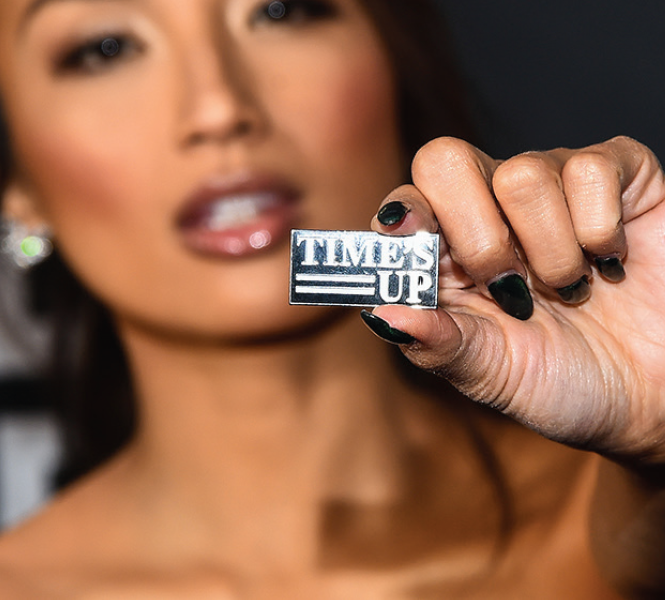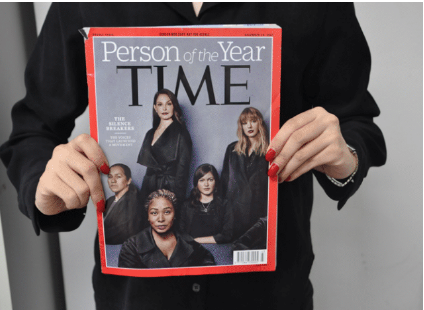
On January 7 2018, the 75th Golden Globe Awards was held, but it was much different than in past events. The red carpet was black. Female actors like Meryl Streep, Angelina Jolie, and Nicole Kidman wore black colored dresses, and male actors like Hugh Jackman and Chris Hemsworth wore black shirts or tuxedos and on the chest of their outfits were black colored badges that read, ‘Time’s Up’. On January 28, at the 60th Annual Grammy Awards, famous musicians like Lady Gaga, Rita Ora, and Camila Cabello wore black colored garments or held white roses to support the Times Up movement. In 2017, TIME magazine chose six silence breakers as persons of the year. Six women dressed in black outfits dawn the cover. Recently, the Times Up and Me Too movements are huge in both Hollywood, U.S. and across the South Korean Peninsula. What exactly are they? Why are they so important?

#MeToo
The Me Too movement focuses on victims of sexual violence who have come forth to detail their experiences on social networking services (SNS). It began in 2006 by social activist Tarana Burke. Victims band together under the hashtag of ‘Me Too’ (#MeToo). After the Harvey Weinstein scandal last year, the Me Too movement gained momentum. Actor Alyssa Milano wrote, “If you’ve been sexually harassed or assaulted write ‘me too’ as a reply to this tweet” on her Twitter account. In just 24 hours of the tweet, more than half a million people retweeted it and showed their support. At present, more than eighty thousand people have posted details of their sexual harassment incidents using the #MeToo hashtag. Me Too campaigns and testimonies related to the crimes carried out by Harvey Weinstein sparked the Time’s Up movement. Wearing black clothes as famous celebrities walk the red carpet is just one of the many ways actors are showing solidarity.
About three hundred movie professionals including Meryl Streep, Reese Witherspoon, and Steven Spielberg raised thirteen million dollars for the campaign and to pay the legal fees of victims of sexual violence and harassment. The term silence breaker comes from the idiom ‘break the silence’. A silence breaker speaks out again sexual assault and harassment. In Korea, a campaign similar to the Me Too campaign exists. Koreans are equating sexual violence to the literary world using the following hashtag: #sexualviolence_in_literaryworld (#문단_내_성폭력) on Twitter. The campaign started after Poet Kim Hyun disclosed what happened to him in 2016. After publicizing his incident, about ten accused criminals’ names were publically released. From this year January, Prosecutor Seo stated that sexual molestation would also be strongly prosecuted. This sparked new interest in the Me Too campaign in Korea. Victims are coming forward from all professions and trades from legal circles, sports, film industry, literary circles, to the theatrical world.

Importance of Saying Me Too
Some people question the need to say “me too”. They ask, “Why didn’t you just say no?” However, the past was not like the present. Victims who felt victimized or suffered anxiety from the sexual harassment or attack were scared that their attackers would retaliate. Moreover, typically the attackers had more power than the victims in society. The openly discussed abuse by Harvey Weinstein who suppressed his victims using his power as a producer in the film industry highlights the past. The past was more male dominated than the present, so victims often faced fierce backlash when they spoke out. A representative example in Korea is the case of poet Choi Yeongmi. According to her interview with JTBC, if a female writer resists the sexual advances of a more powerful male writer, the male writer will take revenge. In major publishing companies, the magazine division never places a female writer in charge of manuscript. Male writers also refuse to review female writers’ work. Victims of these practices find it difficult to prove damages because magazine editors counter their claims with, “the work is not good enough to publish, so we rejected it”. Choi sums up “her life as a writer will end”.1) When your present and your future depends on successful publication, many females find it impossible to merely say “no”.
Kim Seokho, Professor of Sociology at Seoul National University said, “Once the Me Too movement reached a certain level of acceptance in Korea, it resulted in the construction of a helpful community. People started to feel safe and had the courage to speak up without feel of retaliation. As a result, the movement has spread exponentially.”2) As Kim summarizes, victims now have the courage to voice their experiences of sexual assault and harassment. Hence, this movement is much stronger than those initiated in the past. The more people speak up, the more victims feel confident to tell their stories. The Me Too movement also clearly publicizes sexual crimes as sins of the assailants. The campaign creates a social atmosphere that accepts whistle blowing and admits the crime was not the fault of the victim. Society is also now more concerned with the mental health of the victim. Chae Jeongho, Professor of Psychiatry at The Catholic University’s St. Mary’s Hospital, views the Me Too campaign positively. “Most victims blame themselves and the event festers inside them, but revealing and talking about the crime allows the victim to share the pain which helps the healing process.” He added that the Me Too also alleviates the victim’s pain.

Me First? YOU TOO
Particularly in Korea, the ability to voice “Me Too” is still hard. The first obstacle victims face is the idea that they are gold-diggers seeking fame and fortune. Whenever victims come forth with claims of a sexual crime against them, the first thing society says ‘Why were you wearing that outfit anyway?’ and ‘Why were you out so late at night?’ Later, victims are often accused of luring their assailant with sexual advances so that late they could blackmail them. Despite the crime not being the victim’s fault, the victim is made to feel she did something wrong. Secondary damages are even bigger hardships to bear for victims. Secondary damage occurs after the initial crime has taken place and the victim has reported it. These damages include derogation regarding the victim’s appearance and ability, dismissal or expulsion from the company, and assault or verbal abuse. According to Seoul Women Workers Association, 57% of 231 victims who filed sexually harassment grievances at their companies experienced some form of disadvantage at work.3) 53.4% of respondents said they were expelled or dismissed, suffered mental abuse from bullying, and were constantly spoken to using inappropriate words or behavior. The damage suffered by whistle blowers makes victims endure the crime and keep silence. In other words, victims refuse to speak up for fear of repercussion and the likelihood of the crime going unpunished. Society attitudes need changing and new laws are needed that protect victims.
There are already revisions for the law, but victims must endure lengthy waits for the crime to be prosecuted. The victims, during this period, face injury to their honor and false accusations. To prove their innocence, sometimes they need to disclose the entire event and relive the horrific sexual crime. The process is painful. Also, in Korea, there is a law concerning defamation of character, so even if the crime is proven true in the court of law, the victim may be charged with a criminal offense for disclosing the details of her experience and attacker. In England and the United States, defamation of character is not considered a criminal offense and is dealt with in civil court. In Germany, people may only be found guilty of defamation of character if the accusation is false. New law in Korea is needed, but simultaneously, Korea needs to revise its current laws as well.
"Little Girls Don’t Stay Little Forever”
On January 16, Larry Nassar, a former USA gymnastics doctor, has pleaded guilty to ten cases of first degree sexual misconduct. More than ten victims appeared in court to testify against him. The first victim, Kyle Stephens, stated to the court that her abuse started from the time she was 6 years old. Facing him, she utters strongly, “Little girls don’t stay little forever, they grow into strong women that return to destroy your world.” After her emotional testimonial, others came forth. Another victim, Kate Mahon said, “I’m speaking out for all the girls and women of the past, present and future that have been or will be affected by sexual assault.” All victims need to raise their voices and speak out against such atrocities. Courage will overcome the burden of victim shaming. Now that the silence is broken, the time has come for little girls who have grown into strong women to speak up and to speak for each other. It is only then that the world will finally change.
1) Kim Seonmi, “The Literary World’s Poet Choi Yeongmi Claims ‘She Sustained Damages from Sexual Molestation beyond the Actual Crime, Structural Problems’”, JTBC, February 7, 2018
2) Park Seongeun, Park Hyoyeon, “[Cardnews] Accusations of Sexual Violence Are Spurring on the ‘Me Too Movement’”, Yonhapnews, February 11, 2018
3) “Me Too Movement: Why Has It Finally Become So Serious in Korea?”, BBC NEWS Korea, February 4, 2018


